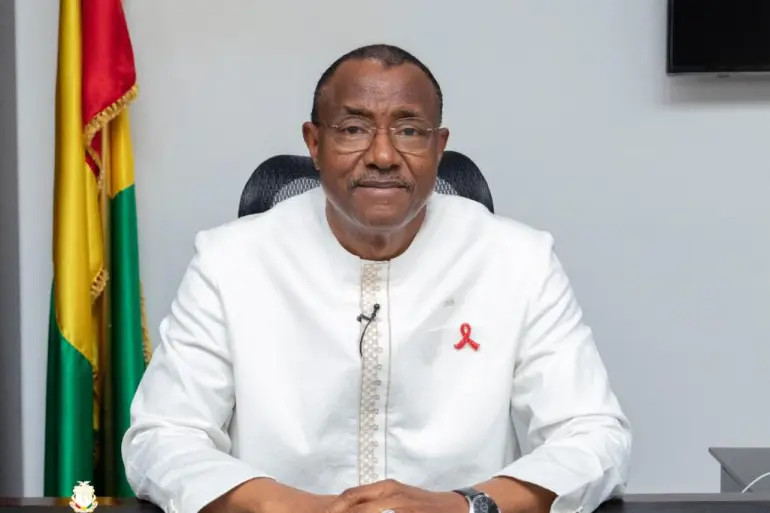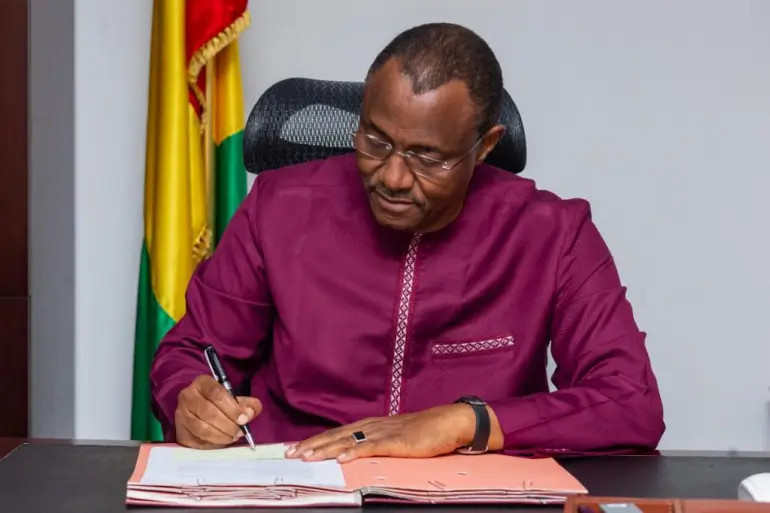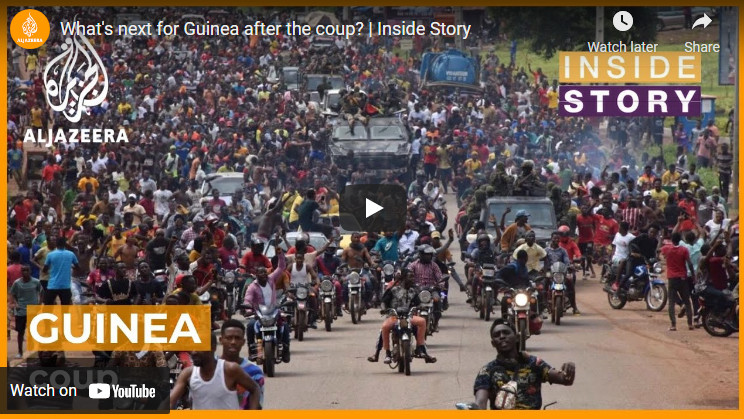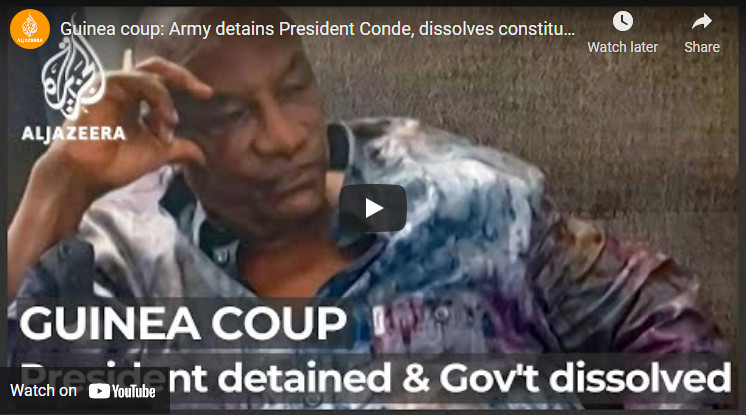
OVERVIEW
MANAGEMENT
PERFORMANCE
POSSIBILITIES
CAPITALS
ACTIVITIES
ACTORS
BURGESS
|
GUINEA
POLITICAL LEADERSHIP Interview: Guinean PM defends record following military coup Interim Prime Minister Mohamed Beavogui tells Al Jazeera that the democratic world has misunderstood the situation in his country. 
Mohamed Beavogui, 68, was appointed as the country's interim prime minister in October after a coup in September 2021 [Guinean Prime Minister's Office] Original article: https://www.aljazeera.com/news/2022/1/26/exclusive-interview-guinea-prime-minister-mohamed-beavogui-defends-coup Burgess COMMENTARY Many countries in Africa became independent in the 1960s. European countries had created different governance frameworks in their colonies, and these governance structures were inheritted by the new indendent nations. I do not know of any country in Africa that embraced much of its ancient indigenous traditions as it gained independence. Starting in the 1970s, I spent a lot of time working in various capacities around Africa. Initially I was the CFO of a company that operated shrimp trawlers around the world, including in several countries in West Africa. We did not operate in Guinea which at the time was dominated by fishing companies from France. Later, in the 1980s and 1990s I did a variety of consulting assignments for the UN and the World Bank in the region. Sadly, the international community of development experts lacked much understanding and empathy for the people of the region which only got worse as the people with real-world experience aged out and were replaced by academically trained experts from the global North! Over time I became less and less popular in places like Washington and Whitehall though quite well respected by all sorts of people in Africa. Bottom line, a lot of money was disbursed by international development organizations into Africa, but much of it was wasted. There are many issues that need to be addressed in order to handle all the problems that Africa has to face. One of these is the issue of borders. Related to this is the role of tribes and their historic access to land. The Berlin Conference in the 19th century defined the borders in Africa based on the colonial situation of the time. These borders did not reflect local tribal realities in any way. Peter Burgess | ||
|
Interview: Guinean PM defends record following military coup
Interim Prime Minister Mohamed Beavogui tells Al Jazeera that the democratic world has misunderstood the situation in his country. By Sam Bradpiece Published On 26 Jan 2022 Soldiers in Guinea led by Colonel Mamady Doumbouya, a soldier trained by the French Foreign Legion, carried out a military coup in September 2021, deposing Alpha Conde who had served as president for more than a decade. Conde had won re-election in 2020 in an election marred by allegations of vote-rigging, a controversial constitutional reform that allowed him to run for a third term in office and brutal suppression of protests. Following the coup, the regional power bloc, ECOWAS, suspended Guinea from its governing bodies and froze the assets of the military government’s leaders and their families. Doumbouya appointed a 68-year-old former UN official, Mohamed Beavogui, as the country’s interim prime minister in October. On Sunday, the military government set up the 80-member National Transitional Council (CNT) to function as a parliament during Guinea’s transition to elections. In an exclusive interview, Beavogui told Al Jazeera that the democratic world has misunderstood the situation in his country, and said that sometimes “the only solution you have is to change the situation through violence.” Al Jazeera: Are you concerned about how the situation in your country looks to outsiders? Mohamed Beavogui: I know that when there is a coup, there is a resentment in democracies around the world. But what we regret a little bit in Guinea is the fact that before the coup, there was a civilian coup. Conde refused to leave office after the end of his term. He changed the constitution. There was a civilian coup that ousted the democratic system. Nobody in the world spoke about it, nobody supported us. It was very difficult to swallow for Guineans. Civilian coups are more complex. They are supported by the world’s democracy. And this is something that people must learn. Al Jazeera: But what makes you any more legitimate than former president Conde? Beavogui: When Colonel Mamady Doumbouya took control, he decided to consult [political, business, and religious leaders] because he wanted things to be inclusive. And that consultation left us with a charter, which is now our constitution. That constitution defined how the process must move forward. It is important that the international community understand that we have certain leaders that become dictators, and then they destroy democracy. They continue to go everywhere and be received in big organisations, received by the heads of states that count in this world. The only solution you have is to change the situation through violence. When you tried to protest peacefully, you were arrested, put in jail and killed without trial. And the world didn’t really move. You must see our state of mind. Somebody came, ousted those people, created an environment that says, “You guys discuss, and start looking at your future”. Hopefully, we’ll be able to get there. Al Jazeera: ECOWAS wants Guinea to hold elections by March this year. Is that realistic? Beavogui: The National Transitional Council (CNT) was created [on Sunday]. These are representatives of the people. We have political parties, civil society, women, youths, we have everyone. The first mission of the CNT is to decide on the timetable for elections. Article 77 of our charter says that the CNT will define the duration of the transition. They are going to start on that immediately. There is a minimum of things we need to have a good transition of power because our state has really failed. We cannot wait for the elections because elections can bring you anything. Al Jazeera: So what exactly are you saying needs to happen in Guinea before elections are held? Beavogui: We need to have a process that helps us speak to each other in a way that we can define what we want the future to be tomorrow: re-writing the constitution, preparing a proper electoral list and then going to elections. That’s one package, but by itself is not sufficient. We need to have solid institutions that are trusted by people based on justice, and properly managing national resources. 
Guinea PM Mohamed Beavogui Beavogui, a former civil servant and expert in agricultural finance, has worked for international organisations, including the UN [Guinean Prime Minister’s Office] We have had a rethink and redesign of our High Judicial Council and we have created a special tribunal against corruption. We are trying to create a justice system that is respected and followed by our people because before, our justice system didn’t have any credibility. We also need to have a minimum of an administration set up. In this country, you find that public service agents are richer than most private-sector people and services are not provided. It is the same thing for our managing of resources and particularly our financial resources. We need to have something minimal – a country that protects its own resources, mobilises them and uses them for the people. Al Jazeera: ECOWAS has imposed tough sanctions on Mali and asked that all member states impose a travel ban on the country. Why isn’t Guinea closing off its northeastern border and is still even allowing flights from Mali? And will you follow their example in pushing elections back for five years? Beavogui: It is just artificial to say that a border exists between Mali and Guinea. You know, historically, we speak the same language, we have the same values locally, we worship the same things and the same religion. That’s the reality. We are like one people. It is like if you and your brother have a compound that your grandfather left for you. You have this land, where all your cows are grazing, your children are jumping. There is no artificial border, you know, this side is yours and that side is mine. As for elections, I can’t decide for the Malians. The Malians must decide for themselves. Whatever happens, in the end, you should finish at the negotiation table. The best thing is to speak, to talk and to exchange. We are all from the same sub-region. We are integrated in our relationship. Al Jazeera: It has been widely reported that Colonel Doumbouya told the national football team that if they do not win the Africa Cup of Nations (AFCON), they will have to pay back the money invested in them by the Guinean football federation. Is this true? Beavogui: The colonel was an instructor in the army. He knows how to be a motivator. He knows how to motivate his troops. Football is a disease. Once you have it, that’s it. This disease is endemic in Guinea and the only way we can cure that disease is to win. [Guinea were knocked out of AFCON by The Gambia 1-0 on Monday.] SOURCE: AL JAZEERA
| The text being discussed is available at | https://www.aljazeera.com/news/2022/1/26/exclusive-interview-guinea-prime-minister-mohamed-beavogui-defends-coup and |

